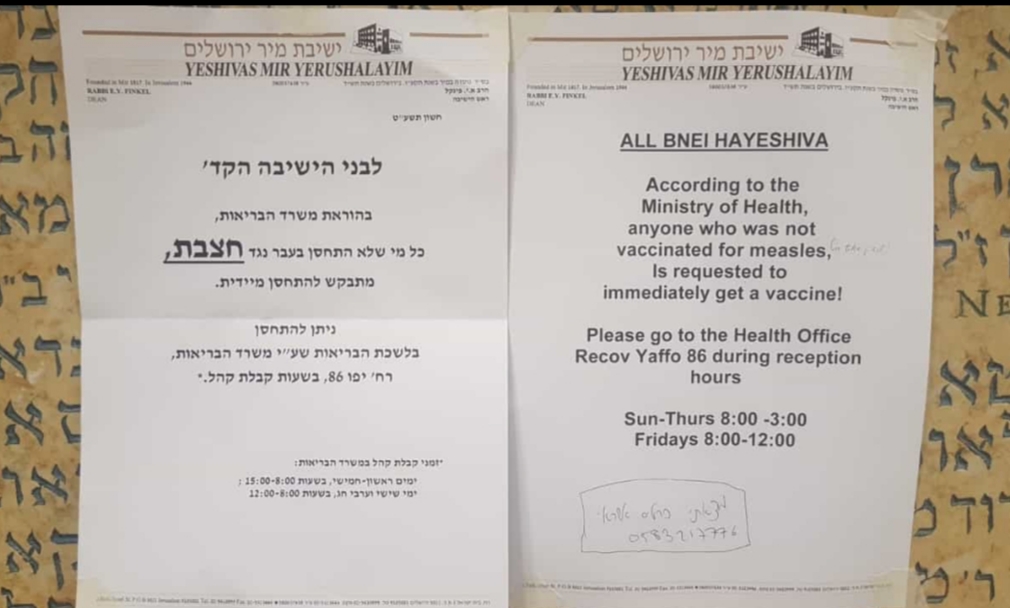On Sunday, Israel’s Health Ministry launched a plan of action to raise vaccination rates in Chareidi communities in and around the Jerusalem region. The plan comes amid one of the worst measles outbreaks in Israel’s history.
According to a statement made by the ministry, sensitive areas of hospitals will now be out-of-bounds for visitors who are not vaccinated against the measles. The wards include the intensive care ward, the maternity ward, and the children’s ward as well as oncology.
The measures would be effective to residents in Jerusalem and Beit Shemesh, especially in the Chareidi community that has a low percentage of people who have been vaccinated.

In an effort to encourage parents to vaccinate their children, Tipat Chalav infant care centers in various Chareidi Jerusalem neighborhoods will now stay open until 8:00PM every day for the next two weeks. Care centers in Beit Shemesh and Beitar Illit, two other areas hit hard by the epidemic will also be open late.
Mobile vaccination clinics are also being sent out in the hardest hit neighborhoods. So far in Jerusalem alone, 753 confirmed cases of the disease have been diagnosed in the Chareidi population. The immunization rate among Chareidim in the city is about 50 percent.
The Health Ministry has reported that there have been 1,300 confirmed cases in Israel in 2018. The Ministry has also begun discussing taking a stronger countermeasure and banning children who are not vaccinated from attending school.
[RELATED – Anti-Vaxxers to DEFY Ban and Send Kids to School; Lakewood Giving Hundreds of Vaccines as Parents Panic]
According to a report in the Times of Israel, on Sunday a child in the south Jerusalem neighborhood of Arnona, a neighborhood that is not Charedi, was diagnosed with measles. Immediately upon the diagnoses being given, the daycare where the child attended, and another next door were closed. The providers of those daycares contacted all parents and told them to vaccinate their children and about the exposure that took place. Throughout the day, the local health clinics in the neighborhood were overcrowded with children awaiting their shots.
Another two teenagers in the northern city of Katzrin on the Golan Heights were diagnosed as well. Neither teen had previously been vaccinated.
Last week, the first recorded death from measles in Israel took place in Jerusalem and claimed the life of an 18-month-old child who was not vaccinated.
(YWN Israel Desk – Jerusalem)












5 Responses
stronger stance how about they lock them up
Haaretz a few years ago:
As it does every winter, Israeli Health Ministry is campaigning heavily to persuade the public to get vaccinated against the flu. Nearly one and a half million people have taken the shot this season, the ministry says. Yet resistance is rearing its head – among doctors and nurses, of all people.
The underlying irony is that while an overwhelming majority of doctors tout the benefits of inoculation for the general public, only 35 percent of medical practitioners get immunized themselves, the Health Ministry admits.
At least they’re in good company – studies done in Europe and the United States show similar scorn for the shot among doctors and nurses, ascribed to a combination of “personal attitude” and misinformation. At least in the United States, the situation is changing: now due to regulatory changes, somewhere between 80 to 90 percent of healthcare workers get the shot, says Dr. Arnold Monto, professor of epidemiology at the University of Michigan and a global influenza expert.
Israel’s “vaccine refuseniks” cite a twofold rationale: they don’t believe they’re likely to get sick, and they don’t like being told what to do.
“Personally, why don’t I take the shot? Because it’s my version of anarchism,” says one physician in Jerusalem, who spoke on the condition of anonymity. The shot makes him feel sick for days, he adds: Why be sick now rather than take the chance of being sick a few days, later?
Maybe because when it gets bad, influenza can kill. The Jerusalem physician however shrugs that he doesn’t belong to a high-risk group, and, he points out, he encourages his family to get the shot…
Influenza-related diseases kill 1,386 people a year in Israel, on average. In the winter of 1999-2000, flu season led to 2,242 deaths (which accounted for more than 6 percent of the total morality rate in Israel during that period, according the Israeli Central Bureau of Statistics).
Flu’s spread can be facilitated in compact places full of potential disseminators – like overcrowded hospitals. In certain hospitals in Israel, occupancy rates can climb as high as 170 percent.
Yet doctors and nurses still shun the shot, whether because they mistakenly figure they’re immunized by sheer exposure – or because they don’t feel like it.
Don’t shame me, I’m a doctor
Some Israeli hospitals and medical centers urge doctors to wear stickers that read “I also got vaccinated for the flu.”
In October, the Ethics Committee of the Israeli Medical Association took a position against the stickers, on the grounds that they were counter-productive. Their use is tantamount to peer pressure to get immunized (and wear the sticker), which could actually diminish the doctors’ willingness to actually get the shot, the IMA wrote.
“It makes you feel not respected,” says one pediatrician who works in the Tel Aviv area. “There needs to be a good reason to get immunized. You need to convince me. But to shame me? I’m a doctor.”
On the global stage, Israel is lauded for its efforts on behalf of vaccinating the public: It is one of few places in the world that has such an active campaign to promote vaccination, says Monto. But Israeli health care workers are free to give reign to their libertarian streak, placing a premium on their individual freedom over the collective good.
Haaretz a few years ago:
As it does every winter, Israeli Health Ministry is campaigning heavily to persuade the public to get vaccinated against the flu. Nearly one and a half million people have taken the shot this season, the ministry says. Yet resistance is rearing its head – among doctors and nurses, of all people.
The underlying irony is that while an overwhelming majority of doctors tout the benefits of inoculation for the general public, only 35 percent of medical practitioners get immunized themselves, the Health Ministry admits.
At least they’re in good company – studies done in Europe and the United States show similar scorn for the shot among doctors and nurses, ascribed to a combination of “personal attitude” and misinformation. At least in the United States, the situation is changing: now due to regulatory changes, somewhere between 80 to 90 percent of healthcare workers get the shot, says Dr. Arnold Monto, professor of epidemiology at the University of Michigan and a global influenza expert.
Israel’s “vaccine refuseniks” cite a twofold rationale: they don’t believe they’re likely to get sick, and they don’t like being told what to do.
“Personally, why don’t I take the shot? Because it’s my version of anarchism,” says one physician in Jerusalem, who spoke on the condition of anonymity. The shot makes him feel sick for days, he adds: Why be sick now rather than take the chance of being sick a few days, later?
Maybe because when it gets bad, influenza can kill. The Jerusalem physician however shrugs that he doesn’t belong to a high-risk group, and, he points out, he encourages his family to get the shot…
Lock them up, quarantine entire families, & FINE THEM!
It is time for truth: please don’t confuse flue vaccination with measles vaccination. Non-vaccination of flu may affect the individual health worker and perhaps very few people in his/her care but measles is spreading like fire!
If the anti-vax people were right; how comes it’s a particular problem in the chareidy community? Do seculars and non-Jews not read all the statistics articles quoted? Obviously there is some misinformation being spread within the frum community on international level.